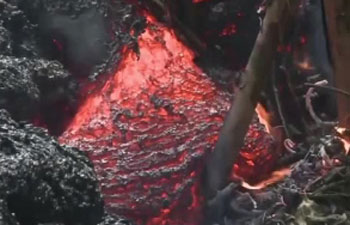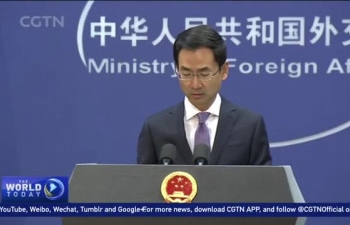AMMAN, May 14 (Xinhua) -- Relocation of U.S. embassy in Israel from Tel Aviv to Jerusalem will fuel regional tension and cause serious consequences, according to Jordanian analysts and officials.
Jordan's Minister of State for Media Affairs Mohammad Momani said that the act of opening the U.S. embassy in Jerusalem and recognizing Jerusalem as the capital of Israel is a clear violation of the UN resolutions.
"Jordan rejects the U.S. decision that lacks legal grounds, and Jordan, like the rest of the world, rejects the U.S. move," said the minister in a statement to the press on Monday.
East Jerusalem is the capital of Palestine, said the minister, stressing the kingdom's custodianship of the city.
The minister added that Jordan, which signed a peace deal with Israel in 1994, will exert all possible efforts to relaunch peace talks between the Palestinians and the Israelis and will continue to work with the international community to protect Jerusalem and the holy sites.
The minister warned of serious consequence of provocations in Jerusalem.
Retired major general and strategic analyst Adeeb Sarayreh said the U.S. move will worsen the situation, in an exclusive interview with Xinhua.
"This U.S. move only serves extremism and violence in the Middle East," Sarayreh said, adding that there is a need for unified efforts to face the U.S. move.
"The Palestinian issue is the key issue in the Middle East and will remain as such... Any provocations will only worsen the situation," he said.
Political analyst Raed Omari agreed.
"I believe a new intifada is likely to occur in the West Bank and Gaza Strip after the invalid U.S. move," Omari told Xinhua.
"The decision by U.S. President Donald Trump is reckless and is likely to fuel more tension...Jordan is directly involved as the Palestinian issue directly affects the kingdom," said Omari.
He added that the U.S. decision, which was rejected by overwhelming majority of world countries, violates UN resolutions and undermines peacemaking efforts.
"The U.S. decision preempts any future peace talks and this is a key obstacle for making peace," said Omari.
In December, the UN General Assembly voted 128-9 with 35 abstentions to adopt a resolution on the status of Jerusalem, which shows that few countries favor the U.S. decision to recognize the holy city as the Israeli capital and mirrors the isolation of the United States on the issue.
The resolution, tabled by Turkey and Yemen in a rare emergency special session at the UN, affirmed that the U.S. decision has "no legal effect, is null and void and must be rescinded in compliance with relevant resolutions of the Security Council."
It also called upon all UN member states to "refrain from the establishment of diplomatic missions in the Holy City of Jerusalem."
The nine countries that voted against the text were Guatemala, Honduras, Marshall Islands, Micronesia, Nauru, Palau, Togo, as well as the United States and Israel.













